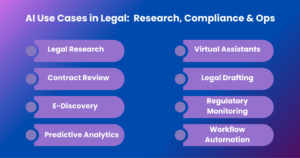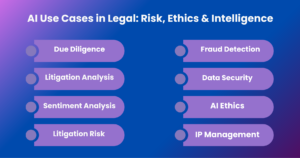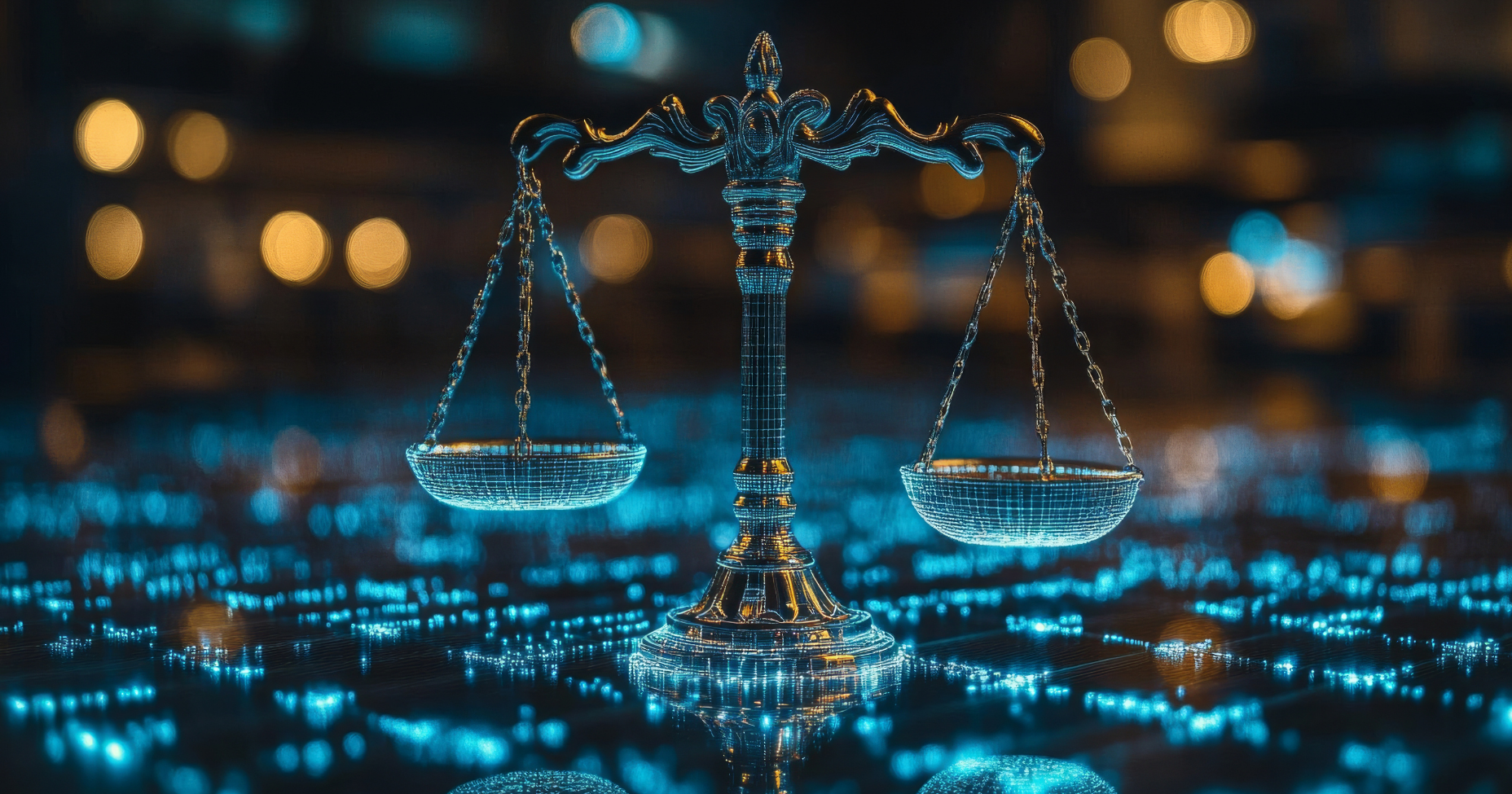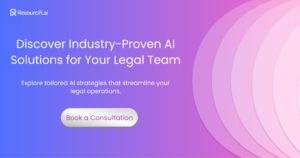Gray Scott once said, “There is no reason and no way that a human mind can keep up with an artificial intelligence machine by 2035”, capturing the truth of how the world is extensively adopting AI not only into their daily lives but to modulate the workflow in large enterprises as well.
Today, the legal industry is at an inflection point, with the roaring rise in complexity of regulations, volumes of data to comprehend, and cost pressure, compelling the legal teams to deliver more accurate results with minimal to no errors. Legal firms have to keep up with the pace and get on board with the latest AI trends to automate workflows, streamline all the research, and improve client services. Adoption of artificial intelligence in legal sectors helps to ace complex tasks and deliver accurate results, which will help the legal firms to free more time for strategizing and client engagement.
Clio’s 2024 Legal Trends Report states that 79% of legal professionals are currently using AI tools in some capacity in their practice, marking a dramatic increase from 19% usage in 2023. However, the American Bar Association’s 2024 report states that 30% of the ‘Law Firms’ overall have started using AI tools. The adoption of AI is picking up in AI in legal industry is not falling behind.
What I see here is opportunity. If about 70% of this industry has still not restructured their working patterns and effectively used AI in law firms, it gives your company an edge to stay ahead of the competition.
In this blog, I will outline 16 enterprise-grade use cases of AI in legal, built on real-world operational demands. Each use case unpacks how AI for lawyers addresses specific bottlenecks and strategic priorities and how enterprise legal teams can move from pilot to production with confidence.
Why Use AI in Legal?
The legal firms and various departments within are facing trouble with growing regulatory obligations, increasing complex contractual ecosystems, and the imperative to scale without exceeding the legal spend. With this, the need for transformation is not optional anymore. AI in the legal industry brings structural changes, too. It offers automation where accuracy is non-negotiable and analytics where foresight drives business value. Legal teams using AI for lawyers are not just gaining efficiency, but reshaping the actual model of legal service delivery.
Here’s where AI delivers tangible impact:
- Artificial intelligence legal research tools reduce weeks of manual case analysis to minutes.
- AI in legal profession theme analysis identifies patterns in judicial behavior and opposing counsel’s arguments.
- AI and predictive analytics in legal decision-making enable risk scoring, judge analytics, and settlement optimization.
- Contract analytics powered by AI detects deviations, highlights exposure, and automates renewals.
- Workflow automation improves matter management, from e-discovery to billing.
- Compliance engines powered by AI track jurisdictional changes in real time.
Artificial intelligence in the legal sector is no longer about experimentation. It is about increasing the quality of work by using limited resources and at a lower cost. Your implementation of AI in law firm would be equipped to maximise the output with minimal input. AI in law firms is stepping into enterprise-wide deployment, backed by KPIs, ROI models, and board-level support.
Use Cases of AI in Legal Industry

1. Legal Research Automation
Scenario:
A litigation team at a mid-sized law firm must comb through thousands of legal precedents to build a case strategy that will often require days of manual review.
AI Solution:
Artificial intelligence legal research tools powered by natural language processing (NLP) transform this process. These tools understand nuanced legal queries, cross-reference court decisions, statutes, and regulations, and deliver accurate results in seconds. For legal departments and law firms, this means higher research precision, faster case prep, and significantly reduced hours.
This is one of the most mature use cases of AI in legal research, demonstrating how AI tools for lawyers are reshaping legal intelligence gathering at scale.
2. Contract Review & Lifecycle Management
Scenario:
An enterprise legal operations team is responsible for managing over 1,000 vendor contracts per quarter. Reviewing terms manually is slow, risk-prone, and incompatible with fast-changing business needs.
AI Solution:
Using AI in legal contract management, systems can automatically extract clauses, flag non-standard language, and create lifecycle triggers, such as renewal alerts or renegotiation flags. These tools are foundational to modern AI in law firms, enabling real-time visibility into legal obligations.
By automating contract review and surfacing risk early, legal teams reduce exposure and ensure regulatory and commercial compliance at scale.
3. E-Discovery Automation
Scenario:
A class-action case involves analyzing over two million internal communications to identify evidence within a tight deadline.
AI Solution:
AI in legal e-discovery accelerates high-volume document processing. Through semantic search, clustering, and context-aware tagging, AI tools drastically reduce the hours required for manual review.
The adoption of artificial intelligence in legal sector discovery workflows helps firms meet litigation deadlines while preserving accuracy and relevance, particularly in complex or cross-border cases.
4. Predictive Legal Analytics
Scenario:
A litigation team wants to forecast the outcome of a discrimination lawsuit using available data on judges, opposing counsel, and precedent.
AI Solution:
This is where AI and predictive analytics in legal decision-making unlock their true potential. Predictive models analyze case history, jurisdictional nuances, and litigation trends to calculate probable outcomes.
This empowers legal leaders to make informed decisions—whether to settle or proceed—and supports strategic allocation of resources. As AI in legal profession theme analysis becomes more advanced, legal analytics are evolving into a core capability of tech-enabled law firms
5. Virtual Legal Assistants (Chatbots)
Scenario:
A legal services provider receives high volumes of repetitive inquiries related to procedural law, forms, and basic rights.
AI Solution:
AI tools for lawyers now include multilingual legal chatbots trained on jurisdiction-specific rules. These bots resolve high-frequency queries instantly, guide users through standard workflows, and reduce the burden on legal support teams. Their use is expanding rapidly in firms exploring scalable AI for lawyers in client service and intake management
6. AI-Powered Legal Drafting
Scenario:
A SaaS company operating in five U.S. states needs customized service agreements that reflect local regulatory requirements.
AI Solution:
AI in legal drafting automates the generation of enforceable, tailored contracts based on logic trees and regulatory databases. Legal teams input deal terms; the system assembles legally compliant documents using approved clause libraries.
This application of artificial intelligence, legal research, and clause modeling improves accuracy, minimizes review time, and enforces consistency across business units.
7. Compliance & Regulatory Monitoring
Scenario:
An investment firm must monitor and act upon evolving privacy regulations across multiple regions, including GDPR, CCPA, and India’s DPDP Act.
AI Solution:
Artificial intelligence in legal sector compliance functions enables real-time tracking of regulatory changes across jurisdictions. AI models monitor legal publications, alert stakeholders, and map impact to existing policies. This is a prime example of how AI in legal industry functions are evolving to match the pace of regulation, ensuring law firms and enterprises stay audit-ready and risk-aware.
8. Workflow Automation
Scenario:
Administrative inefficiencies in a mid-sized law firm result in bottlenecks across intake, billing, and matter assignment.
AI Solution:
AI tools for lawyers integrated with workflow engines (whichever system is used in an individual firm) automate conflict checks, calendar syncs, invoice generation, and email routing. These tools free up legal staff to focus on substantive tasks, not back-office logistics. AI in law firms is no longer just for predicting cases; it is to deliver daily operations with tangible ROI.

9. Due Diligence Analysis
Scenario:
A corporate legal team overseeing a high-stakes acquisition is required to review over 10,000 legal, financial, and regulatory documents in under two weeks.
AI Solution:
This is where AI in legal shines as a force multiplier. By using NLP and classification models, AI can rapidly extract and categorize critical data, flag errors, and prioritize documents based on risk.
In high-volume M&A workflows, AI for lawyers significantly reduces review time and increases diligence accuracy. For teams cracking deals, this means better outcomes and reduced post-closing exposure, which is a non-negotiable for enterprise transactions.
10. Litigation Analysis
Scenario:
Trial counsel wants insight into the argument strategies of opposing lawyers and behavioral patterns of assigned judges, to refine the firm’s litigation strategy.
AI Solution:
AI in legal profession theme analysis enables pattern recognition across court records, revealing trends in judicial decision-making, procedural bias, and preferred legal frameworks. These insights support optimized argument structuring and resource allocation. Integrating AI in law firms is not only about speed but also about the strategic intelligence that can shape how litigation is planned and executed.
11. Sentiment & Testimony Analysis
Scenario:
In a complex class-action case, legal teams must review 500+ plaintiff testimonies for emotional tone, consistency, and possible fabrication.
AI Solution:
By combining AI in legal research with voice and text analytics, it can evaluate credibility signals, identify contradictory statements, and surface anomalous testimonies. Artificial intelligence in the legal sector enables law firms to assess testimony quality at scale, saving you weeks of manual review while enhancing evidentiary strategy.
12. Litigation Risk Assessment
Scenario:
A private equity firm is evaluating a tech company and needs a real-time view of its legal exposure, including ongoing litigation and regulatory investigations.
AI Solution:
With AI and predictive analytics in legal decision-making, legal teams can analyze litigation history, news sources, and public databases to produce risk scores and forecasts. This kind of integration, of AI in legal industry, can provide actionable insights for legal, finance and M&A leaders, helping to avoid bad investments and litigation-driven losses.
13. Fraud Detection
Scenario:
An insurance defense team suspects anomalies in submitted claims, including potential forgery and fabrication in supporting documents.
AI Solution:
AI models trained on known fraud patterns can flag discrepancies in document metadata, syntax, and submission behavior.
This application of AI tools for lawyers reinforces fraud mitigation strategies and enhances internal audit capabilities. It’s a key example of artificial intelligence in legal sector applications focused on risk and compliance.
14. Risk Assessment, Compliance, and Data Security
Scenario:
A global law firm managing sensitive IP and client data must ensure airtight compliance with data protection laws and secure internal systems.
AI Solution:
AI-driven compliance frameworks provide anomaly detection, access control monitoring, and real-time alerts. These capabilities protect sensitive legal data, support internal audits, and ensure firms remain compliant across multiple jurisdictions. For large firms, this is where AI in legal moves from operational convenience to governance necessity.
15. Data Privacy & AI Ethics Audits
Scenario:
A firm deploying generative AI for contract automation must ensure model outputs meet privacy laws and avoid biased language or legal inaccuracies.
AI Solution:
AI audit frameworks can analyze training data, assess output fairness, and verify alignment with GDPR, CCPA, and other mandates.
This represents a new frontier in AI in legal profession theme analysis, where ethical compliance, data privacy, and model explainability are of high importance for enterprise adoption.
16. Intellectual Property (IP) Management
Scenario:
A multinational enterprise holds hundreds of patents and trademarks across jurisdictions and needs to monitor filings, detect infringements, and ensure timely renewals.
AI Solution:
AI in law firms now includes IP portfolio tools that automate prior art search, track legal status across jurisdictions, and provide infringement alerts.
For companies operating in IP-heavy industries, artificial intelligence legal research becomes a strategic asset, maximizing asset value while reducing legal and administrative overhead.
Getting Started with Legal AI
Now that you have gone through all the use cases of AI in legal, you understand that AI in legal is no longer an exploratory initiative; it’s a core business shift. The successful implementation of Artificial Intelligence in legal sector demands a deliberate and phased-out strategy that is rooted in the real operational needs.
The law firms must begin by identifying all the high-friction workflows with measurable impact. It could be any task, such as streamlining legal research, accelerating contract review, or enabling predictive analytics in decision making.
Key factors in a successful deployment include:
- Clear alignment with legal and business goals
- Clean, structured access to historical data
- Well-defined success metrics tied to productivity or compliance
- Legal stakeholder buy-in and model transparency
AI implementation should never be a black box. Solutions must be explainable, secure, and auditable, especially when it is deployed in regulated environments. As AI in legal profession theme analysis changes its course, explainability and compliance are becoming as critical as accuracy.
Legal firms that succeed with AI scale incrementally. Pilot use cases validate assumptions. Integration with CLM, e-discovery, or billing platforms creates sustained ROI. It will equip legal teams with AI tools for lawyers that amplify precision, eliminate delay, and execute future-proof legal operations.
Why Choose Resourcifi.ai?
Resourcifi.ai enables law firms and legal departments to move from AI ambition to AI execution with speed, precision, and confidence.
We specialize in designing, developing, and deploying enterprise-grade AI solutions for the legal industry, from artificial intelligence legal research platforms to advanced litigation analytics and compliance automation engines. Our work is grounded in real legal workflows that are tailored to your firm’s needs and not generic automation models.
What sets us apart:
- We carry an extensive understanding of AI in law firms and enterprise legal operations
- Custom model development (not off-the-shelf) trained on your legal language and your workflow.
- We have a tech-agnostic approach, wherein we tailor the AI recommendations to your goals and not vendor lock-ins.
- Risk-aware deployment with security, fairness, and auditability at the core
We don’t believe in generic technology promises. We build solutions that solve for legal complexity. AI in legal industry is transforming, and with Resourcifi.ai, you’re not just keeping up, you’re leading the transformation.
Maximize Efficiency with Expert AI Consulting
Discover how our tailored AI strategies can optimize operations, automate workflows, and drive innovation across your business.




